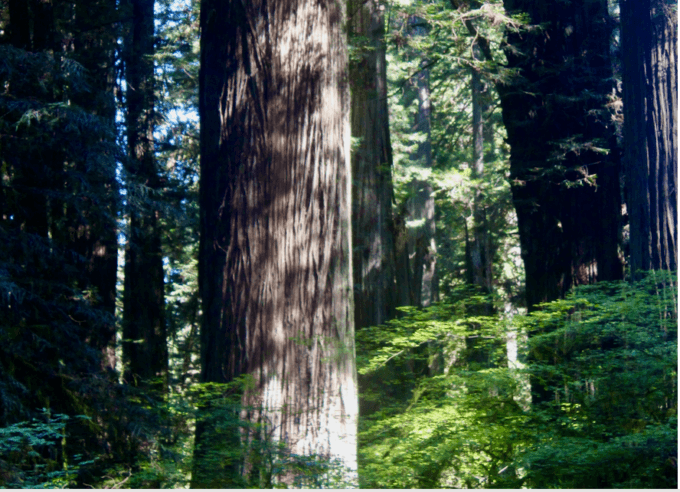
Humboldt Redwoods. Photo: Jeffrey St. Clair.
Griff Griffith, Natural and Cultural Resources Interpreter for Humboldt Redwoods State Park, NCJ-elected “Best Activist of the Year”, is a jolly version of Dr. Seuss’s Lorax. He Speaks for the Trees. As principal host at HRSP’s 101st birthday party last week, he, and other helper- Loraxes, regaled visitors with his reverence for the Park, and the story of the woman who saved a large part of it.
Laura Mahan, born in Loleta in 1861, and recently selected as “Humboldt County Woman of the Year” by state Assemblyman Jim Wood, was the child of a prosperous ranching family. Most of Humboldt’s native redwood forest was still standing. She was propelled into action when Carson Woods, south of Fortuna, got logged. She had played there as a child. In response, she mobilized the timber barons’ wives to save the Park through civil disobedience. Griff made his presentation in front of the stump on which Laura had stood, in 1924, to stop the logging.
Laura did this, so that “unborn generations” could see these trees. And, although of the beloved forests of her youth, only 4.6 % remain, it is apparent, as you meet the people walking on the fern paths in the Park today, that, breathing the bright air, and gazing, awestruck at the largest grove of the tallest trees on earth, their spirits are expanding, enraptured.
Laura, noted Griff, was the first person to “stand in the middle of a logging plan and stop it”. Although women were not even allowed to vote at the time, Laura leveraged her privilege as a wealthy white woman. She had the ear of people in power.
He went on to say that we’re “still working through a lot of the stuff that Laura was working through”. Indeed. There are many people, in Humboldt’s still-dwindling forests, who continue to practice non-violent civil disobedience, to save what’s left. However, far from being treated as heroines, they are roughed up and prosecuted.
Their concerns are identical to Griff’s and Laura’s: the unborn, but, with a modern corollary: the fate of all life on the planet.
The Park is still threatened. The floods of 1955 and 1964 swept giant debris masses, generated by upstream logging on Bull Creek, down, through the Grove, to the Eel, tearing out hundreds of giant trees and destroying the huge salmon runs. To remedy this, the Park purchased a large upstream area for a buffer and spent millions to stabilize it. However, it remains fragile.
PG&E has been decimating this buffer. While Southern California Edison cuts 2 trees per mile, PG&E cuts 152 and only to address its own liability. By removing large trees, which shaded out brush and retained moisture, PG&E increases fire risk to the forest. The soil is disrupted. Many of the trees are far from the lines. The large tree trunks will rot, and further destabilize the precipitous slopes. The wildlife corridor is destroyed.
As Federal Judge Alsup observed when he was forced to terminate PG&E’s probation last January, “One systemic cause, in my view, is that for decades, PG&E has been outsourcing to independent contractors its statutory responsibility for finding and removing hazard trees and for maintaining vegetation clearances. A large part of the wildfire problem has been sloppy inspection and clearance”.
But, it is cheaper than undergrounding or insulating the wires.
PG&E, a convicted criminal is unrepentant. As Judge Alsup remarked, “Rehabilitation of a criminal offender remains the paramount goal of probation. During these five years of criminal probation, we have tried hard to rehabilitate PG&E. As the supervising District Judge however I must acknowledge failure…In these five years of probation, PG&E has gone on a crime spree and will emerge from probation as a continuing menace to California.”
Laura Mahan-style forest defenders patrolled the wild and rugged Bull Creek road for four months last winter, protecting the Park. But concerned letters to Victor Bjelajac, Park Superintendent, Amber Transou, ecologist, and State Secretary Armando Quintero, have not been answered.
The Park is curiously silent.
PG&E has power in Sacramento.
And now it is being given carte blanche. SB 396, already passed by the Assembly, is approaching the Senate. The bill allows PG&E to cut trees on private property against the will of the property owner, and to take legal action if obstructed.